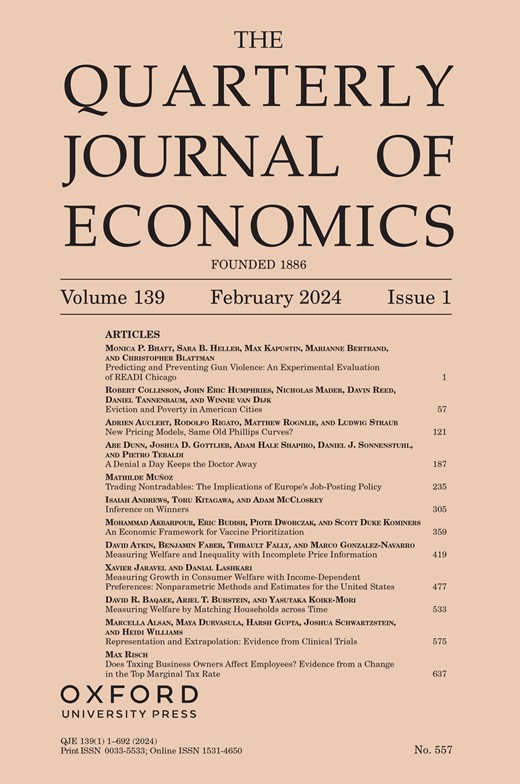Lights, Camera … Income! Illuminating the National Accounts-Household Surveys Debate
IF 12.7
1区 经济学
Q1 ECONOMICS
引用次数: 196
Abstract
GDP per capita and household survey means present conflicting pictures of the rate of economic development in emerging countries. One of the areas in which the national accounts–household surveys debate is key is the measurement of developing world poverty. We propose a data-driven method to assess the relative quality of GDP per capita and survey means by comparing them to the evolution of satellite-recorded nighttime lights. Our main assumption, which is robust to a variety of specification checks, is that the measurement error in nighttime lights is unrelated to the measurement errors in either national accounts or survey means. We obtain estimates of weights on national accounts and survey means in an optimal proxy for true income; these weights are very large for national accounts and very modest for survey means. We conclusively reject the null hypothesis that the optimal weight on surveys is greater than the optimal weight on national accounts, and we generally fail to reject the null hypothesis that the optimal weight on surveys is zero. Additionally, we provide evidence that national accounts are good indicators of desirable outcomes for the poor (such as longer life expectancy, better education and access to safe water), and we show that surveys appear to perform worse in developing countries that are richer and that are growing faster. Therefore, we interpret our results as providing support for estimates of world poverty that are based on national accounts. JEL Code: I32.灯光、相机……收入!照亮国民账户与家庭调查之争
人均国内生产总值(GDP)和住户调查数据显示,新兴国家的经济发展速度相互矛盾。衡量发展中国家的贫困是国民核算与家庭调查之间争论的关键领域之一。我们提出了一种数据驱动的方法,通过将人均GDP和调查手段与卫星记录的夜间灯光的演变进行比较,来评估它们的相对质量。我们的主要假设是,夜间灯光的测量误差与国民账户或调查手段的测量误差无关,这对各种规格检查都是稳健的。我们获得了国民账户和调查手段在真实收入的最佳代理中的权重估计;这些权重对于国民账户来说非常大,对于调查手段来说非常小。我们最终拒绝了调查的最优权重大于国民账户的最优权重的零假设,我们通常不能拒绝调查的最优权重为零的零假设。此外,我们提供的证据表明,国民账户是穷人理想结果的良好指标(如更长的预期寿命、更好的教育和获得安全饮用水),我们还表明,在更富裕、增长更快的发展中国家,调查似乎表现得更差。因此,我们将我们的结果解释为为基于国民账户的世界贫困估计提供了支持。JEL代码:I32。
本文章由计算机程序翻译,如有差异,请以英文原文为准。
求助全文
约1分钟内获得全文
求助全文
来源期刊

Quarterly Journal of Economics
ECONOMICS-
CiteScore
24.20
自引率
2.20%
发文量
42
期刊介绍:
The Quarterly Journal of Economics stands as the oldest professional journal of economics in the English language. Published under the editorial guidance of Harvard University's Department of Economics, it comprehensively covers all aspects of the field. Esteemed by professional and academic economists as well as students worldwide, QJE holds unparalleled value in the economic discourse.
 求助内容:
求助内容: 应助结果提醒方式:
应助结果提醒方式:


